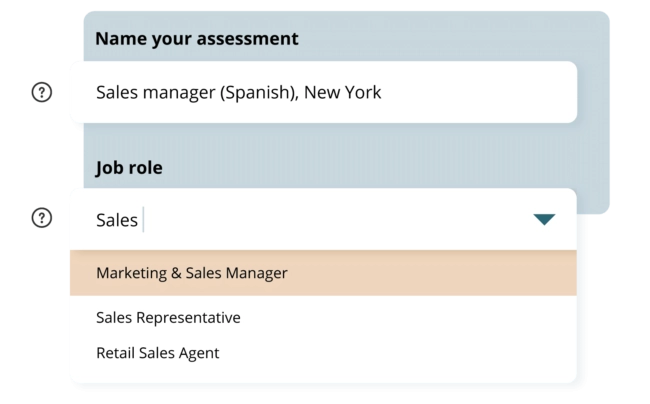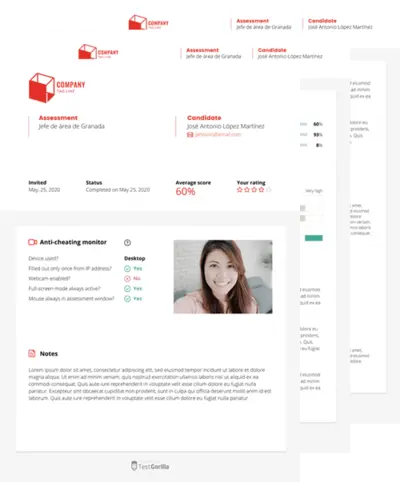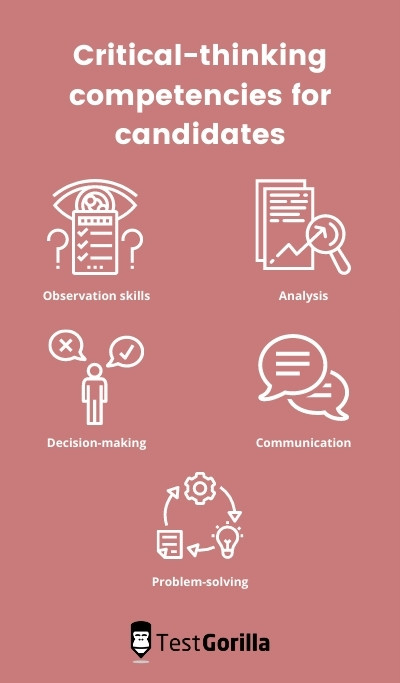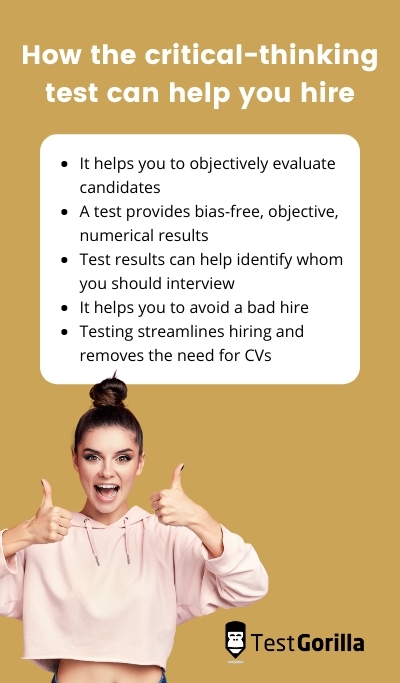Critical thinking test: Pre-employment skills assessment for hiring the best candidates
Summary of the Critical thinking test
This online critical thinking screening test evaluates candidates’ skills in critical thinking through inductive and deductive reasoning problems. This pre-employment skills test will help you identify candidates who can evaluate information and make sound judgments using analytical skills.
Covered skills
Solving syllogisms (deductive reasoning)
Interpreting sequences & arrangements
Understanding cause & effect relationships
Recognizing assumptions
Use the Critical thinking test to hire
Any role that involves a high degree of critical and independent thinking to solve complex problems, such as analysts, executive positions, legal roles, computer and data scientists, among others.
Type
Time
Languages
Level
About the Critical thinking test
Effective critical thinking requires the ability to actively and skillfully conceptualize, apply, analyze, synthesize, and evaluate information to make a judgment or formulate an innovative solution. Employees with strong critical thinking skills can solve issues skillfully and independently and devise new approaches to complex problems using analytical skills.
This critical thinking test evaluates candidates’ abilities to solve syllogisms through deductive reasoning, to Interpret sequences and arrangements and draw sound conclusions, to evaluate cause and effect relationships, and to recognize assumptions. The test presents candidates with single or multiple statements and asks them to analyze the information given therein and use logic to identify the right answer.
Candidates who score high on this test tend to have a well-trained working memory. If you are looking for candidates that think independently, solve complex problems, and generate innovative solutions, this is the right test. This is a great test to include to check candidates' overall analytical skills.
The test is made by a subject-matter expert
Anirban C.
The global IT industry has benefited from Anirban’s talents for over two decades. With a flawless reputation that precedes him, Anirban has earned a status as a sought-after agile project manager and consultant. He’s worked internationally as a Senior Project Manager with companies such as Ericsson, IBM, and T-Mobile.
Anirban’s love for learning helps him keep his skills sharp. He holds an MBA and a degree in engineering, is a certified Scrum Master, and has certifications in Prince2 and ITIL.
Crafted with expert knowledge
TestGorilla’s tests are created by subject matter experts. We assess potential subject-matter experts based on their knowledge, ability, and reputation. Before being published, each test is peer-reviewed by another expert, then calibrated using hundreds of test takers with relevant experience in the subject. Our feedback mechanisms and unique algorithms allow our subject-matter experts to constantly improve their tests.
What our customers are saying
TestGorilla helps me to assess engineers rapidly. Creating assessments for different positions is easy due to pre-existing templates. You can create an assessment in less than 2 minutes. The interface is intuitive and it’s easy to visualize results per assessment.
David Felipe C.
VP of Engineering, Mid-Market (51-1000 emp.)

Any tool can have functions—bells and whistles. Not every tool comes armed with staff passionate about making the user experience positive.
The TestGorilla team only offers useful insights to user challenges, they engage in conversation.
For instance, I recently asked a question about a Python test I intended to implement. Instead of receiving “oh, that test would work perfectly for your solution,” or, “at this time we’re thinking about implementing a solution that may or may not…” I received a direct and straightforward answer with additional thoughts to help shape the solution.
I hope that TestGorilla realizes the value proposition in their work is not only the platform but the type of support that’s provided.
For a bit of context—I am a diversity recruiter trying to create a platform that removes bias from the hiring process and encourages the discovery of new and unseen talent.
David B.
Chief Talent Connector, Small-Business (50 or fewer emp.)

Use TestGorilla to hire the best faster, easier and bias-free
Our screening tests identify the best candidates and make your hiring decisions faster, easier, and bias-free.
Watch what TestGorilla can do for you
Create high-quality assessments, fast
Building assessments is a breeze with TestGorilla. Get started with these simple steps.
View a sample report
The Critical thinking test will be included in a PDF report along with the other tests from your assessment. You can easily download and share this report with colleagues and candidates.
Why a Critical thinking test is important
A critical-thinking test evaluates applicants’ skills through two forms of reasoning: deductive and inductive. This test will help you find the candidates who make great decisions based on analytical thinking from the information they have at their disposal.
And that’s what critical thinking is: Taking in limited information, analyzing it, figuring out the best possible course, and then taking action. Candidates with these skills will carefully look at the pros and cons, advantages and disadvantages, strengths and weaknesses, and then make a decision with all the data and information in mind.
In a business setting, this can be the difference between one employee who is on their way to a promotion and another who can’t seem to close a sale.
And critical thinking has many applications in the business environment.
Critical thinking in the workplace
There are many ways in which an employee can use critical thinking in the workplace. Here are some situations where a candidate with great critical-thinking skills could make a difference.
• Sales. People with great critical-thinking skills can really amplify their sales results. When talking with potential clients, they can use their critical-thinking skills to handle any objections that the prospect might have and influence them to make a buying decision.
• Marketing. Candidates with critical-thinking skills would use them to create marketing campaigns that send a message in a creative way, staying within their budget but reaching a wider audience because of the way the message is conveyed. And on top of that, candidates with great critical-thinking skills will take input from their team members to get more information before making a decision.
• Product development. Critical-thinking skills are essential in the product development team because the employees who work here have to figure out how to create new features and benefits for a product so that it appeals to their customers.
• HR. When conducting a performance review or an exit interview, a person with critical-thinking skills will handle both instances better than someone without. When doing a performance review, they will ask probing questions to figure out why the team member didn’t hit their goals – or even better, they will work out why the employee achieved their targets with ease. In an exit interview, they will know how to ask the right questions of the individual leaving the organization to get the most important information.
Critical-thinking competencies for candidates
A candidate with critical-thinking skills will have a number of competencies:
• Observation skills: Candidates with critical-thinking skills will be observant. They will always try to get information. Sometimes, they will have people tell them the information, but they will also observe their environment and the people around them.
• Analysis: When they observe their environment and the people in it, they are able to analyze the data and the situation at hand. They can use analysis in a new situation that requires fast thinking, but they can also slow down and analyze situations by asking questions and carrying out research. They know the importance of data so they try to analyze it as thoroughly as possible with the time they have at their disposal.
• Decide: After observing and analyzing the data, it’s time to make a decision. This decision will always be based on partial data, but the candidate will be sure to analyze every piece of information they have so that the decision is based on the data.
• Communication: A great critical thinker also knows the importance of communicating their decisions to those around them. Critical thinking produces decisions and people with this skill know that they need to explain their position to others.
• Problem-solving: Problem-solving is all about execution. After the candidate has observed, analyzed, decided, and communicated their decision, it’s time to implement the solution. Even though the decision won’t always produce the desired results, it will be the right decision if the candidate took into account all the information they had before making it.
What happens when a candidate doesn’t have critical-thinking skills
Critical-thinking skills require candidates to slow down, take a breath, and analyze a situation to come up with the best possible solution to it.
A candidate with fewer critical-thinking skills will jump to a conclusion without taking into consideration the data or information at hand. This can create quite a lot of turmoil in the workplace. Not only that, but this kind of behavior can create a lot of problems when dealing with customers and clients.
For example, if a client doesn’t answer their emails for a couple of days because they are in the middle of negotiations, a candidate with no critical-thinking skills might rush to send an email to the customer demanding an answer. This could create a bad experience for the potential client, resulting in the breakdown of negotiations.
On the other hand, a candidate with critical-thinking skills will slow down and wait for a little while because there could be a number of reasons why somebody has not responded to their email for a couple of days.
How the critical-thinking test can help recruiters hire
The critical-thinking test can help recruiters hire people who have this skill. Including it in an assessment provides bias-free, objective, numerical results that can be used to identify the top candidates for your hiring manager to interview.
With a pre-employment test, you can prevent the bias that creeps in during the CV screening process. Not only that but giving your candidates a critical-thinking test is simple and fast: whether your hiring manager has 50 or 300 applicants, they can send the test to all of them with a single click.
In summary
Critical-thinking skills are essential for any business environment. To properly evaluate them, you should give your candidates a critical-thinking test. TestGorilla’s science-backed critical-thinking test enables you to rank your applicants according to who performs best, based on fair, objective, bias-free results. So be sure to use a pre-employment critical-thinking test to assess the critical skills of all your candidates at the start of your hiring process.
FAQs
Related tests
Basic Math Calculations
Mechanical reasoning
Understanding Instructions
Attention to detail (visual)
Intermediate math
Basic triple-digit math
Basic double-digit math
Attention to detail (textual)
Problem Solving
Numerical reasoning












